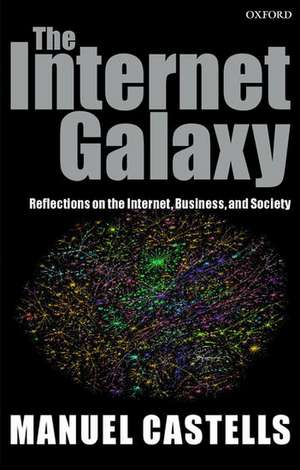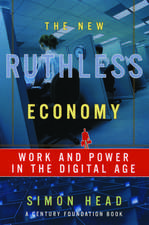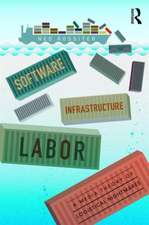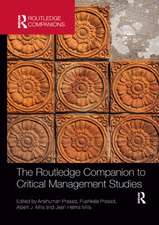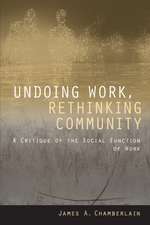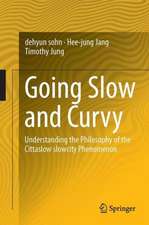The Internet Galaxy: Reflections on the Internet, Business, and Society: Clarendon Lectures in Management Studies
Autor Manuel Castellsen Limba Engleză Paperback – 31 oct 2002
| Toate formatele și edițiile | Preț | Express |
|---|---|---|
| Paperback (1) | 320.23 lei 32-37 zile | |
| Oxford University Press – 31 oct 2002 | 320.23 lei 32-37 zile | |
| Hardback (1) | 322.57 lei 32-37 zile | |
| OUP OXFORD – 17 oct 2001 | 322.57 lei 32-37 zile |
Preț: 320.23 lei
Preț vechi: 359.80 lei
-11% Nou
Puncte Express: 480
Preț estimativ în valută:
61.28€ • 65.53$ • 51.09£
61.28€ • 65.53$ • 51.09£
Carte tipărită la comandă
Livrare economică 07-12 aprilie
Preluare comenzi: 021 569.72.76
Specificații
ISBN-13: 9780199255771
ISBN-10: 0199255776
Pagini: 306
Ilustrații: 2 maps
Dimensiuni: 140 x 215 x 16 mm
Greutate: 0.38 kg
Editura: Oxford University Press
Colecția OUP Oxford
Seria Clarendon Lectures in Management Studies
Locul publicării:Oxford, United Kingdom
ISBN-10: 0199255776
Pagini: 306
Ilustrații: 2 maps
Dimensiuni: 140 x 215 x 16 mm
Greutate: 0.38 kg
Editura: Oxford University Press
Colecția OUP Oxford
Seria Clarendon Lectures in Management Studies
Locul publicării:Oxford, United Kingdom
Recenzii
A very readable and stimulating book.
[An] excellent, readable, nontechnical summary of the history, social implications and likely future of Internet business.
. . . a superb guide to the workings of the internet and its wider implications. . . . [Castells] brings a sociologist's understanding of the importance of culture in business to his analysis of the internet. . . . stands supreme as a wise and insightful guide to the web.
The Internet is shaping society and in turn being shaped by society. It takes a scholar of Manuel Castells's range to do justice to this phenomenon. His book is learned without being pompous, and insightful without being impenetrable. If we ever get a discipline of Internet studies, this will be one of its founding texts.
Manuel Castells has proved once again that he has an unmatched synoptic capacity to make sense of the complexities of a networked world, and here writes with clarity and insight about everything from the history of the technology to the subcultures that have done so much to shape it.
Castells is probably the world's most highly regarded commentator on the information age and new economic order.
. . . a readable, articulate and persuasive account of why the internet's most powerful impacts on the shape of business, politics and society may be yet to come.
Thoroughly researched ... [and] truly global in scope. Castells provides balanced coverage of e-business and the new economy; the politics of the Internet, including privacy and freedom; and the geography of the Internet....Highly recommended for academic libraries.
Absorbing history....Castells observes that while the Internet has the potential to strengthen democracy through broadening the sources of information and enabling greater citizenship participation, it has at the same time contributed greatly to the politics of scandal.... In his sobering final chapter, the author studies the divide betweenpeoples and regions that operate in the digital world and those that cannot.
The Internet Galaxy is the best attempt by a big thinker to grapple with the net's long-term implications for our society.
This small but complete volume is a critical introduction to internet-related theories, while doubling as a simplified reader on [Castells'] own ideas. The book should help to spread his influence beyond the faithful.
[An] excellent, readable, nontechnical summary of the history, social implications and likely future of Internet business.
. . . a superb guide to the workings of the internet and its wider implications. . . . [Castells] brings a sociologist's understanding of the importance of culture in business to his analysis of the internet. . . . stands supreme as a wise and insightful guide to the web.
The Internet is shaping society and in turn being shaped by society. It takes a scholar of Manuel Castells's range to do justice to this phenomenon. His book is learned without being pompous, and insightful without being impenetrable. If we ever get a discipline of Internet studies, this will be one of its founding texts.
Manuel Castells has proved once again that he has an unmatched synoptic capacity to make sense of the complexities of a networked world, and here writes with clarity and insight about everything from the history of the technology to the subcultures that have done so much to shape it.
Castells is probably the world's most highly regarded commentator on the information age and new economic order.
. . . a readable, articulate and persuasive account of why the internet's most powerful impacts on the shape of business, politics and society may be yet to come.
Thoroughly researched ... [and] truly global in scope. Castells provides balanced coverage of e-business and the new economy; the politics of the Internet, including privacy and freedom; and the geography of the Internet....Highly recommended for academic libraries.
Absorbing history....Castells observes that while the Internet has the potential to strengthen democracy through broadening the sources of information and enabling greater citizenship participation, it has at the same time contributed greatly to the politics of scandal.... In his sobering final chapter, the author studies the divide betweenpeoples and regions that operate in the digital world and those that cannot.
The Internet Galaxy is the best attempt by a big thinker to grapple with the net's long-term implications for our society.
This small but complete volume is a critical introduction to internet-related theories, while doubling as a simplified reader on [Castells'] own ideas. The book should help to spread his influence beyond the faithful.
Notă biografică
Manuel Castells, born in Spain in 1942, is Professor of Sociology, and Professor of City & Regional Planning at the University of California, Berkeley, where he was appointed in 1979 after teaching for twelve years at the University of Paris. He has also been a visiting professor in fifteen universities around the world, and an invited lecturer in hundreds of academic and professional institutions in thirty-five countries. He has published twenty books including the trilogy The Information Age: Economy, Society, and Culture, published by Blackwell in 1996-2000, and translated into twelve languages. Among other appointments, he has been a member of the European Commission's High Level Expert Group on the Information Society (1995/97), and a member of the United Nations Secretary General's Advisory Board on Information and Communication Technologies (2000/2001).
